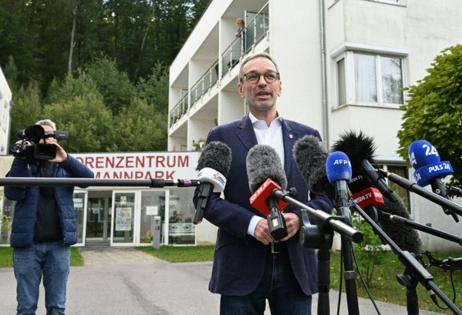Austrian far right wins election but establishment set to govern
Published in Political News
Austria’s traditional political powers are pledging to block the far-right Freedom Party from forming a government following Sunday’s national elections, marking the latest effort to stem the rising tide of populism in Europe.
How they’ll achieve that, replicating a strategy adopted in Germany and France, is set to become the subject of lengthy coalition negotiations beginning in the days ahead.
Despite winning the most votes for the first time in a national election, the Freedom Party’s divisive leader, Herbert Kickl, appears unlikely to play a role in Austria’s next cabinet.
All other parties set to win seats in parliament have vowed not to work with him, depriving his group of the 50% needed to form a government.
That leaves open the possibility for the second- and third-place parties, the conservative People’s Party of Chancellor Karl Nehammer and the Social Democrats, to join forces to rule the country instead.
While the Freedom Party may “create a stink” publicly about not receiving the mandate to form a government, Kickl will likely content himself with building popular support in opposition, said Marcus How, a geopolitical risk analyst at VE Insight.
“It could feasibly play into Kickl’s hands, as he’ll argue the coalition formed of losers,” How said. “He will not unreasonably bank on its dysfunction and unpopularity, hoping that this will strengthen the Freedom Party ahead of the next elections.”
A combination of Austria’s two main traditional parties used to be the country’s default arrangement, making up more than half of its governments since World War II. On occasion, the Freedom Party joined one of them to run the country — most recently from 2017 in Sebastian Kurz’s cabinet — though never as the dominant group.
Opening negotiations with Freedom Party over a potential coalition would be “reckless,” Nehammer said on Sunday. The People’s Party will “stand by their word” not to form a government with the far-right movement as long as Kickl remains its leader.
The People’s Party and Socialists are projected to have 93 seats together, according to preliminary results — just enough for a majority — but they still may include a third party in their coalition, most likely the liberal NEOS.
“I won’t have you in government,” NEOS head Beate Meinl-Reisinger told Kickl. “I simply find you wrong for the country.”
Kickl was quick to condemn the move to freeze him out of talks, accusing his opponents of breaking with constitutional precedent and ignoring the will of the voters.
“Now the Freedom Party is the strongest and suddenly everything is supposed to be different,” he told public broadcaster ORF. “This is their next attempt to fool the people.”
For Kickl, the fact that he’s considered a toxic presence by most competitors doesn’t help. He’s pledged to deport asylum seekers and stop supporting Ukraine’s defense against Russian aggression.
Blocking the far-right resembles political patterns across Europe. In Germany, the AfD won regional elections in Thuringia, only for the other parties to refuse to engage with the party. A left-wing alliance in France stopped Marine Le Pen’s National Rally from scoring an election victory in July.
Meanwhile, Geert Wilders’s far-right group took power in the Netherlands as member of a four-party coalition, but Wilders himself isn’t part of the executive.
Such an option looks unlikely in Austria, as Kickl has said a similar decision by then-party chief Jörg Haider in the early 2000s to give the chancellor position to the People’s Party — despite coming ahead of them in the election — was a mistake.
A three-party coalition would be a first for Austria, and finding common ground for a joint government program will be an arduous task. All party leaders — even Kickl — agree that “something has to change” in the country, but they disagree on the particulars.
Austrian coalition negotiations have traditionally taken months, not weeks, so the talks could stretch into next year. Nehammer’s existing team — made up of the People’s Party and the Greens — will continue to govern in the meantime.
Whoever forms the next government will face a lengthy list of policy challenges.
Despite being one of Europe’s wealthiest nations based on gross domestic product per capita, the competitiveness of Austria’s industrial base is at risk from aggressive wage hikes and government handouts to compensate for fast inflation. The likely end of Russian gas deliveries in December removes a cheaper source of energy, and the transition to alternative sources is fraught with risks.
_____
(With assistance from Kristian Siedenburg.)
_____
©2024 Bloomberg L.P. Visit bloomberg.com. Distributed by Tribune Content Agency, LLC.




























































Comments